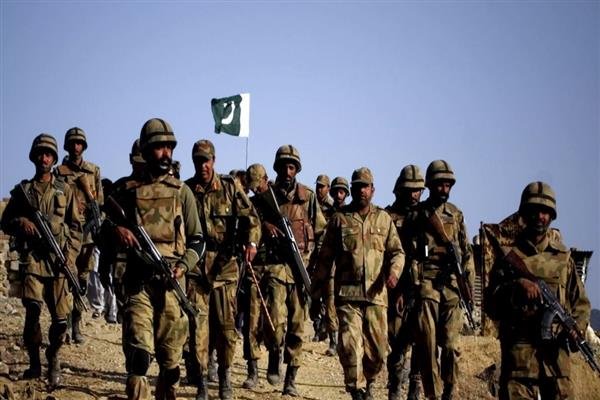In recent developments, Pakistan has accused Afghanistan of being complicit in a surge of terrorist activities, pointing to a string of attacks, including a deadly assault on a border Army post. Officials from Pakistan’s foreign ministry have stated that Islamabad conducted intelligence-based anti-terror operations in border regions of Afghanistan, targeting militants associated with the Hafiz Gul Bahadur Group.
The Hafiz Gul Bahadur Group has been implicated in numerous attacks within Pakistan, alongside the Tehrik-i-Taliban Pakistan (TTP). These operations come in response to escalating violence, notably a March 16 militant attack that claimed the lives of seven Pakistani soldiers at a border Army post. The attack, attributed to militants crossing over from Afghanistan, prompted swift retaliatory measures by Pakistani security forces.
Last week’s suicide bombing in northwestern Pakistan, which resulted in the deaths of seven soldiers, was a stark reminder of the persistent threat posed by terrorist organizations operating along the Pakistan-Afghanistan border. In response, Pakistani security forces engaged and neutralized all six attackers involved in the bombing, demonstrating a firm resolve to combat terrorism within its borders.
While a newly formed militant group, Jaish-e-Fursan-e-Muhammad, claimed responsibility for the Mir Ali attack, Pakistani security officials believe that the group comprises primarily members of the Tehrik-e-Taliban Pakistan (TTP). The TTP, a banned outfit, has long been involved in orchestrating acts of terrorism aimed at destabilizing Pakistan’s security and governance.
The Pakistani military has underscored the need for enhanced vigilance and security measures to counter the evolving terrorist threats emanating from across the border. It has noted a concerning increase in terrorist incidents, facilitated by support from elements within the Afghan Taliban and the influx of modern weaponry into the region.
The relationship between Pakistan and Afghanistan, particularly concerning border security and counterterrorism efforts, has been fraught with challenges and mutual suspicions. Both countries have accused each other of harboring and supporting militant groups that operate along their shared border, exacerbating tensions and hindering bilateral cooperation in combating terrorism.
Pakistan’s accusations against Afghanistan highlight the complexities of regional security dynamics and underscore the urgent need for coordinated efforts to address the menace of terrorism. Efforts to enhance intelligence-sharing, border management, and joint counterterrorism operations between Pakistan and Afghanistan are crucial to effectively combatting extremist elements operating in the region.
In response to Pakistan’s allegations, Afghan authorities have reiterated their commitment to combating terrorism and maintaining security along the border. Afghanistan has faced its own challenges in combating terrorism, contending with various insurgent groups and internal security threats.
The international community, including key stakeholders such as the United States, has a vested interest in promoting stability and security in the region. Addressing the root causes of terrorism, fostering dialogue between Pakistan and Afghanistan, and supporting efforts to strengthen governance and socioeconomic development are essential components of a comprehensive approach to countering extremism and violence.
As Pakistan intensifies its efforts to root out terrorism and ensure the safety and security of its citizens, collaboration with regional and international partners will be crucial in achieving long-term stability and peace in the volatile border region. By addressing the underlying drivers of extremism and fostering cooperation among neighboring countries, the scourge of terrorism can be effectively tackled, paving the way for a more secure and prosperous future for the region.
